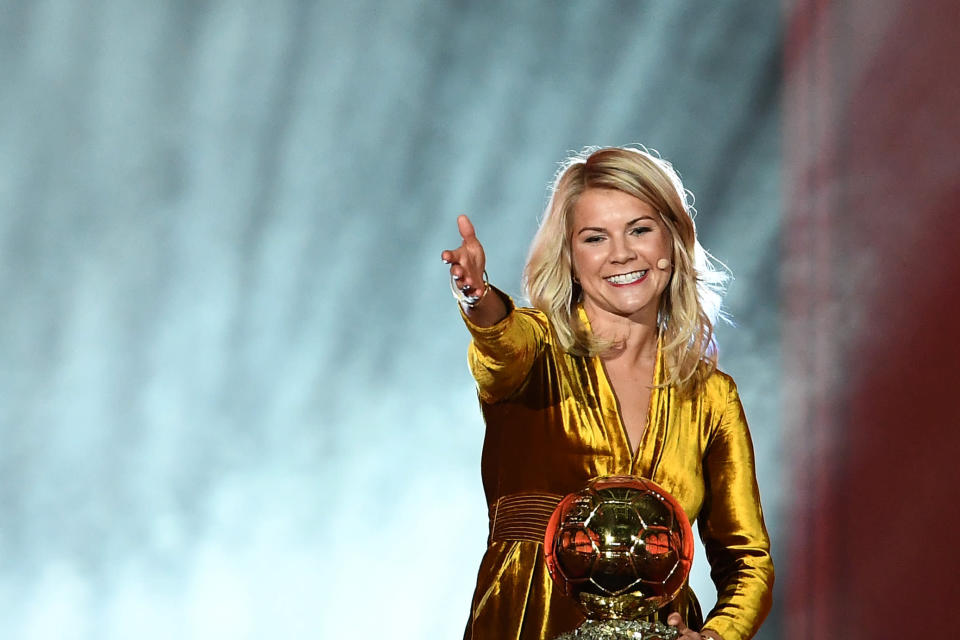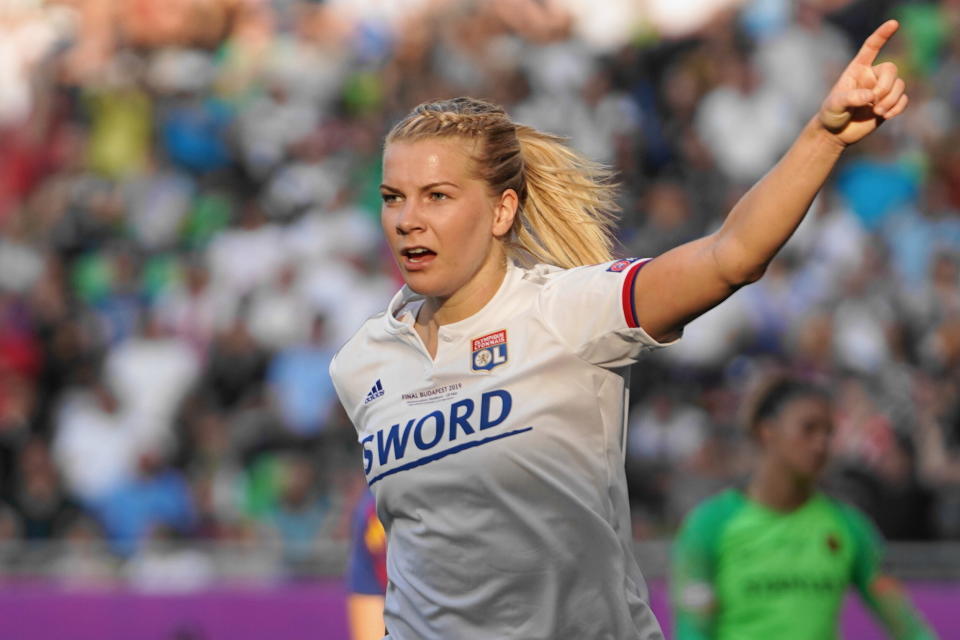Why Ada Hegerberg, the planet's best female soccer player, is skipping the Women's World Cup
Ada Hegerberg would rather not talk about it. After all, there is plenty else to discuss. Such as her 255 goals in 254 club appearances. Or her four consecutive Champions League titles, and 13 trophies in five years at Lyon, all at the startlingly young age of 23.
There is also the inaugural Ballon d’Or Feminin, which Hegerberg lifted last December. There is her powerful message to young girls that night, a night she said was a “huge step for women’s football,” a night that was about “equality” and “respect.”
But the question on the tips of tongues as the 2019 Women’s World Cup approaches: Why won’t Hegerberg, widely considered the best female footballer on Earth, be playing for her native Norway?
It’s a difficult one to answer, largely because the one woman capable of doing so never really has – at least not publicly and definitively.
Hegerberg, ever since leaving the Norwegian national team 22 months ago, has largely preferred to give her reasons in private. She has met and spoken with representatives from the Norwegian Football Federation (NFF), outlining her decision and what must change for her to reverse it.
Her lack of public specificity has allowed speculation and misinformation to run rampant. Dig deep enough, and you’ll find suggestions that she is protesting FIFA’s machismo. (She’s not.) You’ll find her example lumped in with equal pay debates. You’ll hear rumors of dressing-room rifts and the like.
Hegerberg has, however, spoken about her decision. It is, in short, a protest of how women’s soccer is treated in Norway. Here’s what we know.
Hegerberg quit after Norway’s Euro 2017 flameout. But ...
Hegerberg’s last game for her national team was July 24, 2017 – the third of three punchless performances at Euro 2017, the third of three defeats that saw Norway crash out of the tournament without a single goal.
The following month, the 22-year-old striker announced that she would be stepping away. Given the timing, many interpreted it as a snap reaction to the Euro flameout. More rumors swirled of off-field drama. Some even assumed Hegerberg was frustrated that her older sister, Andrine, had been left on the bench. (Ada has strongly denied this claim.)
But there was, and is, far more to the story.

As Hegerberg wrote at the time, “the decision is not only a consequence of this year's European Championship, but is based on my experiences with the national teams over a long period of time.”
Indeed, a year earlier, as a 21-year-old, she was already speaking up. In a lengthy interview that December, she effectively challenged the NFF, asking whether it had the ambition necessary to push women’s soccer forward. At youth levels, she said, boys were being taken more seriously than girls.
“I don’t want to be too negative,” she explained. “But at the same time, [I want to] point to what the problems are, what is totally absurd and can be done much better.”
“It is about respect,” she said. “And I think women's football does not have the respect it should have in Norway.”
Hegerberg’s decision isn’t about money
Months after Hegerberg stepped away, the Norwegian federation signed a historic collective-bargaining agreement that granted equal pay to its male and female players. Men’s national teamers agreed to take pay cuts to bring female player salaries up to par with theirs. The arrangement was hailed globally as a significant positive step toward gender equality in sports. It also made casual observers wonder: If Norway is ahead of the rest of the world on this issue, then why the heck is Hegerberg protesting?
But this is not, and never has been, all about money.
“I try to not talk as much about money when I talk about making a difference,” Hegerberg recently said on the Olympic Channel podcast. “Because it’s much bigger than that as well – the respect, and the attitude about women, women playing football, I think that’s a more important place to start.
“And then you have the economy. I never expect to earn as much as the [men’s] Ballon d’Or [winners] do. ... But small step by step, giving us what we earn, what we deserve, is a better place to start. Because I don’t think most of the women players get what they deserve today.”
“It's about attitude and respect,” Hegerberg told the BBC last month. “We're talking about young girls getting the same opportunity as boys – giving them the same opportunity to dream.”

Hegerberg’s reasoning
Hegerberg initially planned not to publicize her reasoning. Then, after realizing the popular narrative had been spun against her, she altered that stance.
Speaking to Norwegian newspaper Aftenposten 24 hours after the announcement, she revealed that she often felt like a “worse player” after international breaks. She explained how her simmering dissatisfaction with the federation “peaked” after the Euros. She criticized pre-tournament planning. She lamented “bad communication.” And she spoke about “takhøyde,” a Norwegian term that doesn’t translate literally to English, but which loosely means “room for self-expression” – something there wasn’t enough of within the national team.
“It is difficult to have a voice,” she told Aftenposten.
Hegerberg is limitlessly ambitious. It’s the reason she was named the best player in Europe at age 21, and the best in the world at age 23. There’s a story of a 16-year-old Hegerberg urging older teammates to up their levels in training. As Norwegian national team manager Martin Sjögren said in 2017: “She is rarely happy with what she has done and is constantly looking at things she can do better.”
That, in essence, is also the reason she is at odds with the federation. She feels the NFF doesn’t do enough to match her ambition. Others confuse her ambition for arrogance.
Hegerberg was asked on the Olympic Channel podcast: Have you ever felt that you are being dragged down by teammates, or by people around you, for having huge ambitions?
“Yeah,” she responded. “I mean, I don’t play for the national team anymore. That’s quite a good example of what we’re talking about now. I need to take a choice, whether to lose myself ... to be put in that box, or to continue on the highest level.

“The culture has been pulled down,” she said. “The culture of winning, the culture of putting the women in a good spot of development. ... I was super motivated to become even greater on the pitch, and to succeed.” But the federation, she said, “doesn’t live up to expectations to move the women up.
“I feel I’ve done everything to have an impact on what could be improved,” she continued. “And when I could see that I couldn’t change anything, and when I started to lose myself ... in that system, I couldn’t continue.”
Why Hegerberg feels compelled to take a stand
The federation’s current leadership has attempted to win her back. But its comments in the immediate aftermath of her August 2017 announcement likely deepened the wound. The federation’s shortcomings overrode her desire to represent her nation.
“I’m still a proud Norwegian,” she said on the podcast. “I love my country, I miss representing my country. That explains the whole situation, I feel, because I didn’t ask to be in this position. But that’s the reality. ... My connection to Norway is the same as always. It’s just that I don’t play for the national team.”
Instead, she has become a prominent voice for gender equality in soccer. "It would be easy for me to perform, do my thing, and stay quiet,” she told the BBC. “But it's so much bigger than that.” While she will not have the opportunity to dazzle on the world’s grandest stage this summer, her long-term impact on the sport could be even grander.
But she also knows it will take more than voices. "It's great that we all talk about investment,” she told the BBC. “But there needs to be action behind it as well. If we don't push for the change for women's football to go in the right direction then it won't come by itself. I think sometimes we need to come away and think, 'Are we going as fast as we should be? Are we doing things right? Is this all talk?’”
“We live in a world of change, I believe,” she said on the podcast. “You can see that more and more women stand up for rights, especially in sports, as well as in society. So it’s all about supporting each other. Trying to succeed [in] changing the world in the aspect of attitude. That’s what needs to be done in Norwegian football, in Norway, even though we have a great democracy, and equality, we’re still a ways behind when it comes to sports.”
– – – – – – –
Henry Bushnell is a features writer for Yahoo Sports. Have a tip? Question? Comment? Email him at henrydbushnell@gmail.com, or follow him on Twitter @HenryBushnell, and on Facebook.


